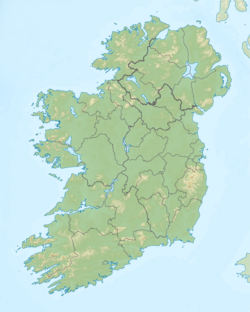Salvelinus grayi, also called Gray's char[r], Lough Melvin char[r] or freshwater herring,[4][5] is a species of lacustrine char in the family Salmonidae.[6][7]
| Salvelinus grayi | |
|---|---|

| |
| Scientific classification | |
| Domain: | Eukaryota |
| Kingdom: | Animalia |
| Phylum: | Chordata |
| Class: | Actinopterygii |
| Order: | Salmoniformes |
| Family: | Salmonidae |
| Genus: | Salvelinus |
| Species: | S. grayi
|
| Binomial name | |
| Salvelinus grayi | |
| Synonyms | |
|
Salmo grayi (Günther, 1862)[3] | |
It is only found in Lough Melvin, Ireland;[8] numbers of fish are declining and the species is considered critically endangered by the International Union for Conservation of Nature.
Taxonomy
editName
editThe describer, Albert Günther, named the fish after his longtime colleague John Edward Gray. The English word "char[r]" is thought to derive from Old Irish ceara/cera meaning "[blood] red,"[9] referring to its pink-red underside.[10][11] This would also connect with its Welsh name torgoch, "red belly."[12]
Description
editThis species grows to an average length of 10 to 12 in (25 to 30 cm) and a weight of 8 ounces (230 g). Compared to other members of the Salvelinus genus, it has a deeper body that is more laterally compressed, a shorter caudal peduncle and larger scales.[13] It can be distinguished from other char by the whitish spots on upper flank and caudal and dorsal fins.[14]
Biology
editSalvelinus grayi is benthopelagic, living at 10–30 m (30–100 ft), except during the spawning season. It feeds on water fleas (crustaceans of the order Cladocera). It spawns in November, in shallow rocky areas.[14]
Conservation
editRecorded numbers in Lough Melvin declined from 33 in 1975 and 42 in 1986, to only 12 in 2001, and the species is considered critically endangered. Common rudd introduction and eutrophication are blamed for the decline. In 2003, a plan to relocate some of the fish to a nearby reservoir failed when no fish could be found despite extensive search. Nor was the fish observed to be spawning in its traditional spawning locations. The lake has experienced increasing levels of phosphorus as a result of agricultural activities in its catchment area, and char are notoriously sensitive to phosphorus. Another factor in the fish's decline may be the introduction into the lake of rudd and roach.[1]
References
edit- ^ a b Freyhof, J.; Kottelat, M. (2008). "Salvelinus grayi". IUCN Red List of Threatened Species. 2008: e.T135413A4126003. doi:10.2305/IUCN.UK.2008.RLTS.T135413A4126003.en. Retrieved 13 November 2021.
- ^ "WoRMS - World Register of Marine Species - Salvelinus grayi (Günther, 1862)". www.marinespecies.org.
- ^ Couch, Jonathan (28 February 1877). A History of the Fishes of the British Islands. G. Bell. p. 263 – via Internet Archive.
Gray's Char.
- ^ Thompson, Wm. (1841). "Notes on British Char, Salmo Umbla, Linn., S. Salvelinus, Don". The Annals and Magazine of Natural History: Including Zoology, Botany, and Geology. 6. R. and J. E. Taylor: 444 – via Google Books.
- ^ MacMahon, Alexander Francis Magri (28 February 2018). "Fishlore: British Freshwater Fishes". Penguin Books – via Google Books.
- ^ Thompson, Wm. (1841). "Notes on British Char, Salmo Umbla, Linn., S. Salvelinus, Don". The Annals and Magazine of Natural History: Including Zoology, Botany, and Geology. 6. R. and J. E. Taylor: 446 – via Google Books.
- ^ "The Salmon and Trout Magazine". Salmon and Trout Assoc. 28 February 2018 – via Google Books.
- ^ "The Salmon and Trout Magazine". Salmon and Trout Assoc. 28 February 1964 – via Google Books.
- ^ "Search term: ? 2 cera". eDIL - Irish Language Dictionary.
- ^ Skeat, Walter W. (15 February 2013). An Etymological Dictionary of the English Language. Courier Corporation. ISBN 9780486317656 – via Google Books.
- ^ Chambers's Twentieth Century Dictionary (part 1 of 4: A-D). Library of Alexandria. ISBN 9781465562883 – via Google Books.
- ^ Weekley, Ernest (5 March 2013). An Etymological Dictionary of Modern English. Courier Corporation. ISBN 9780486122878 – via Google Books.
- ^ Jenkins, J. Travis (1925). The Fishes of the British Isles. Frederick Warne & Co. pp. 238–239.
- ^ a b "Salvelinus grayi summary page". FishBase.

